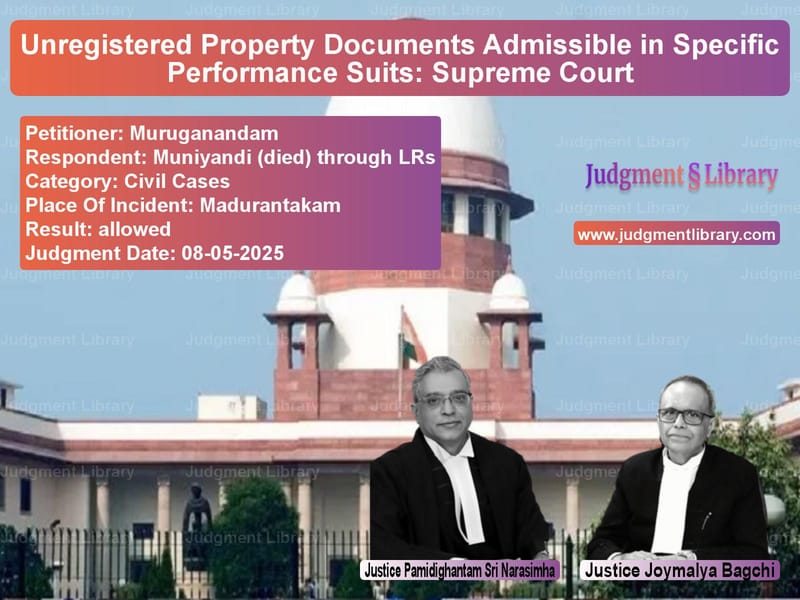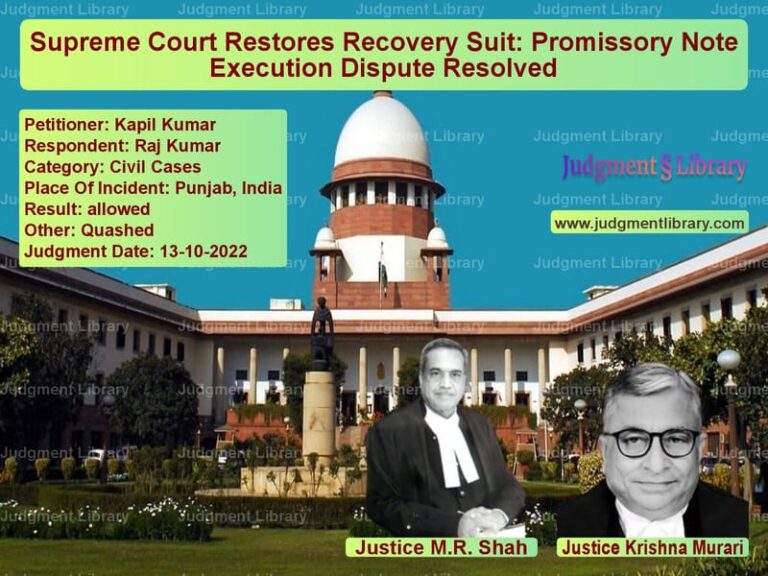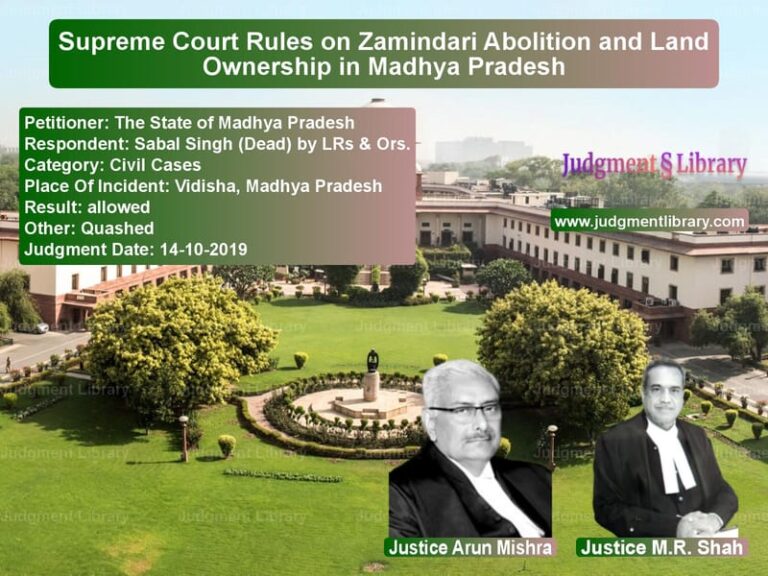Unregistered Property Documents Admissible in Specific Performance Suits: Supreme Court
In a landmark judgment that clarifies the evidentiary value of unregistered property documents in civil litigation, the Supreme Court of India has delivered a significant ruling that balances legal technicalities with the pursuit of substantive justice. The case of Muruganandam versus Muniyandi (died) through LRs represents a crucial interpretation of property law principles, particularly concerning the admissibility of unregistered documents in suits for specific performance of contracts. This judgment not only resolves an individual dispute but also establishes important precedents that will guide countless property transactions and legal proceedings across the country, especially in matters where documentation may not strictly comply with registration requirements but still represents genuine contractual intentions between parties.
The legal battle began with a property dispute that traces its origins back to the year 2000. According to Muruganandam, the appellant in this case, an agreement of sale was executed on January 1, 2000, wherein the respondent Muniyandi agreed to sell his property after receiving an initial payment of Rs. 5,000 as part consideration. Crucially, the appellant claimed that he was put in possession of the property pursuant to this agreement, a fact that would become significant in the subsequent legal proceedings. The transaction took another turn on September 1, 2002, when the parties allegedly agreed that the property should be sold at the rate of Rs. 550 per cent, with the appellant paying an additional Rs. 10,000 and making subsequent payments towards the balance consideration from time to time.
However, the relationship between the parties soured when the respondent failed to take steps towards executing the sale deed despite receiving payments. Left with no other recourse, Muruganandam instituted a suit for specific performance of the agreement and sought a permanent injunction to protect his interests in the property. Specific performance suits are equitable remedies where courts direct parties to fulfill their contractual obligations, typically used in property transactions where monetary compensation would be inadequate.
The case took a procedural turn when, pending disposal of the suit, the appellant filed an interlocutory application under Order 7, Rule 14(3) read with Section 151 of the Code of Civil Procedure, 1908. This application sought permission to bring on record and mark the original document dated January 1, 2000. The appellant explained that due to genuine reasons, the original document had gotten mixed up with other papers and couldn’t be produced earlier. He emphasized that a photocopy of the document had already been enclosed with the plaint, and therefore the respondent wouldn’t suffer any prejudice if the original was admitted at this stage.
The Trial Court, however, dismissed the application on April 21, 2015, citing multiple grounds. The court found the reasons for not producing the original document unconvincing. More significantly, it held that the document was unstamped and unregistered, making it barred under Section 35 of the Indian Stamp Act, 1989, and Section 17 of the Registration Act, 1908. This decision reflected a strict interpretation of the statutory requirements for property documents, particularly the mandatory registration provisions for instruments that purport to transfer immovable property.
Unsatisfied with this outcome, the appellant approached the High Court of Judicature at Madras through a Civil Revision Petition. The High Court, in its order dated February 26, 2021, affirmed the Trial Court’s view, holding that the document could not be brought on record because it was unstamped and unregistered. This dismissal led the appellant to approach the Supreme Court as a final recourse, setting the stage for a significant interpretation of property law principles.
Before the Supreme Court, the learned counsel for the appellant presented compelling arguments that challenged the lower courts’ interpretation of the relevant statutes. The counsel submitted that “the courts below have disregarded the proviso to Section 49 of the Registration Act which allows tendering of documents that endorses an oral agreement of sale.” This argument pointed to a crucial exception in the registration law that the lower courts had apparently overlooked. To support his contention, the counsel relied on the decision of the Supreme Court in S. Kaladevi v. V.R. Somasundaram, a precedent that specifically addressed the admissibility of unregistered documents in specific performance suits.
The appellant’s counsel also made a significant technical argument regarding the application of Section 17(1A) of the Registration Act, submitting that “reliance on Section 17(1A) of the Registration Act was not correct in as much as the document was executed on 01.01.2000.” This highlighted the importance of the document’s execution date in determining which version of the statute applied, as amendments to registration laws may have different temporal applications.
The Supreme Court bench comprising Justice Pamidighantam Sri Narasimha and Justice Joymalya Bagchi carefully considered the matter and delivered a judgment that focused on the proper interpretation of Section 49 of the Registration Act. The court observed that “Having considered the matter in detail, we are of the opinion that the prayer of the appellant in the interlocutory application falls under proviso to Section 49 of the Registration Act which provides that an unregistered document affecting immovable property may be received as evidence of a contract in a suit for specific performance. The proviso also enables the said document to be received in evidence of a collateral transaction.”
The court extensively quoted Section 49 of the Registration Act, which states: “No document required by section 17 [or by any provision of the Transfer of Property Act, 1882, to be registered shall— (a) affect any immovable property comprised therein, or (b) confer any power to adopt, or (c) be received as evidence of any transaction affecting such property or conferring such power, unless it has been registered: Provided that an unregistered document affecting immovable property and required by this Act or the Transfer of Property Act, 1882, to be registered may be received as evidence of a contract in a suit for specific performance under Chapter II of the Specific Relief Act, 1877 or as evidence of any collateral transaction not required to be effected by registered instrument.”
The Supreme Court placed significant reliance on its earlier decision in Kaladevi’s case, quoting the relevant portion: “The main provision in Section 49 provides that any document which is required to be registered, if not registered, shall not affect any immovable property comprised therein nor such document shall be received as evidence of any transaction affecting such property. The proviso, however, would show that an unregistered document affecting immovable property and required by the 1908 Act or the Transfer of Property Act, 1882 to be registered may be received as an evidence to the contract in a suit for specific performance or as evidence of any collateral transaction not required to be effected by registered instrument. By virtue of the proviso, therefore, an unregistered sale deed of an immovable property of the value of Rs 100 and more could be admitted in evidence as evidence of a contract in a suit for specific performance of the contract. Such an unregistered sale deed can also be admitted in evidence as an evidence of any collateral transaction not required to be effected by registered document. When an unregistered sale deed is tendered in evidence, not as evidence of a completed sale, but as proof of an oral agreement of sale, the deed can be received in evidence making an endorsement that it is received only as evidence of an oral agreement of sale under the proviso to Section 49 of 1908 Act.”
The court noted several factual aspects that supported the appellant’s case. It observed that “It is also evident from the plaint that the document dated 01.01.2000 is referred to and in fact a photocopy of the said document is filed along with the plaint.” This indicated that the document’s existence and contents were already part of the court record, and the respondent had been aware of it from the beginning of the litigation.
The Supreme Court accepted the appellant’s contention regarding the purpose of introducing the document, noting that “It is the case of the appellant that the document sought to be brought on record is intended only to be used as a proof of the oral agreement of sale and that it is permitted under Section 49 of the Registration Act.” This distinction between using a document as evidence of a completed transfer versus evidence of a contractual agreement proved crucial in the court’s analysis.
Based on this comprehensive examination, the Supreme Court concluded: “Under these facts and circumstances, we are of the opinion that the appellant can be permitted to introduce the said document dated 01.01.2000.” However, the court was careful to clarify the limitations of its decision, stating: “We make it clear that we have not expressed any opinion on the contents of the document and it is also open for the respondent/defendant to raise and contest the relevancy and validity of the document as are permissible in law and it is for the Trial Court to consider the submissions and pass appropriate judgment/order as it considers appropriate.”
This clarification ensured that while the document would be admitted as evidence, its ultimate weight and credibility would be determined by the Trial Court during the full hearing of the case. The Supreme Court’s role was limited to deciding the preliminary question of admissibility, not the substantive merits of the document’s contents.
The final outcome saw the Supreme Court allowing the appeal and setting aside the judgments of both the High Court and the Trial Court. The court directed that “the I.A. No. 1397 of 2014 in OS No. 78 of 2012 for marking document dated 01.01.2000 is allowed,” thereby permitting the appellant to introduce the document as evidence in the specific performance suit.
This judgment has far-reaching implications for property law jurisprudence in India. It reaffirms the principle that while registration requirements for property documents are mandatory for establishing legal title, unregistered documents can still serve as evidence of contractual agreements in specific performance suits. This distinction is crucial because it prevents technical violations of registration laws from completely undermining genuine contractual arrangements between parties.
The ruling also highlights the equitable nature of specific performance as a remedy. Unlike mere claims for damages, specific performance suits seek to enforce the actual performance of contracts, particularly in cases involving unique assets like real property where monetary compensation may be inadequate. By allowing unregistered documents as evidence in such suits, the Supreme Court has ensured that the substantive justice of enforcing legitimate contracts is not defeated by procedural technicalities.
For the common citizen involved in property transactions, this judgment provides important guidance. It emphasizes the importance of proper documentation and registration while also recognizing that imperfect documents may still have evidentiary value in appropriate circumstances. However, it also serves as a cautionary tale about the complications that can arise from inadequate documentation and the importance of complying with legal requirements for property transactions.
The Supreme Court’s decision also demonstrates the judiciary’s role in interpreting statutes in a manner that balances strict legal requirements with the needs of justice. By focusing on the proviso to Section 49 of the Registration Act, the court has given effect to the legislative intent behind this exception, which is to prevent genuine contractual claims from being dismissed on purely technical grounds.
In conclusion, the Supreme Court’s judgment in Muruganandam versus Muniyandi represents a significant contribution to Indian property law jurisprudence. It clarifies the evidentiary status of unregistered documents in specific performance suits and ensures that technical violations of registration requirements do not automatically invalidate genuine contractual claims. The judgment strikes an appropriate balance between upholding statutory requirements and ensuring that substantive justice is achieved in contractual disputes, particularly in the context of immovable property transactions where the stakes are often high and the relationships complex.
Petitioner Name: Muruganandam.Respondent Name: Muniyandi (died) through LRs.Judgment By: Justice Pamidighantam Sri Narasimha, Justice Joymalya Bagchi.Place Of Incident: Madurantakam.Judgment Date: 08-05-2025.Result: allowed.
Don’t miss out on the full details! Download the complete judgment in PDF format below and gain valuable insights instantly!
Download Judgment: muruganandam-vs-muniyandi-(died)-thr-supreme-court-of-india-judgment-dated-08-05-2025.pdf
Directly Download Judgment: Directly download this Judgment
See all petitions in Property Disputes
See all petitions in Contract Disputes
See all petitions in Specific Performance
See all petitions in Lease Agreements
See all petitions in Judgment by P.S. Narasimha
See all petitions in Judgment by Joymalya Bagchi
See all petitions in allowed
See all petitions in supreme court of India judgments May 2025
See all petitions in 2025 judgments
See all posts in Civil Cases Category
See all allowed petitions in Civil Cases Category
See all Dismissed petitions in Civil Cases Category
See all partially allowed petitions in Civil Cases Category







